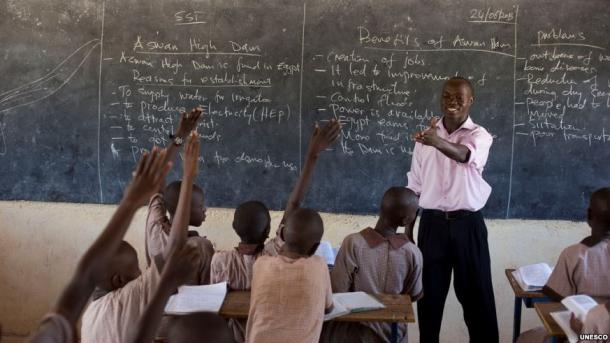Renewing Our Commitment to Transforming Education for the African Union’s Year of Education
Mohammed Belhocine
March 15, 2024
H.E. Prof. Mohammed Belhocine is Commissioner, Department of Education, Science, Technology, and Innovation (ESTI), at the African Union. This post is reproduced from the Commissioner’s foreword for the first issue of the Educating and Skilling Africa magazine.
“Education is the most powerful weapon which you can use to change the world”.
Nelson Mandela
“Give them the education which will train their heads to refuse the wretchedness of mind and skill their hands to develop the resources of Africa.”
Julius Nyerere

It is with great pleasure and enthusiasm that I present to you the inaugural issue of the Teacher Magazine. I am honoured, as the Commissioner for Education, Science, Technology, and Innovation of the African Union, to introduce this Magazine dedicated to celebrating the invaluable role of teachers and their impact on education in Africa.
Education has long been recognized as a fundamental pillar for the development and progress of any nation. It is through quality education that individuals acquire the knowledge, skills, and values necessary to build a brighter future for themselves and their communities. Therefore, it is only fitting that the African Union
has chosen Education as the theme of the year 2024 with the specific message: “Educating an African Citizen Fit for the 21st Century: Creating Resilient Education Systems for Greater Access to Inclusive, Sustainable, Quality and Appropriate Learning in Africa”.
At present, we face critical challenges in the realization of universal primary and secondary education by 2030. Despite significant progress made over the years, four main indicators are sounding the alarm bells, as they highlight the depth of the education crisis on the African continent. A significant percentage of children and young people in the official age bracket for various levels of education are not enrolled in schools. This number has reached the alarming global estimate of 98 million in sub-Saharan Africa, at around 20% of the school-age population. In addition, the proportion of children who cannot read and comprehend a simple text by the age of 10 has probably worsened after the pandemic and is estimated at 90%. This means, 9 out of 10 children cannot read and comprehend a simple text by the age of 10.
This is where teachers play a pivotal role. Teachers are the key drivers of effective learning and transformation. They possess the ability to inspire, guide, and empower young minds, shaping them into responsible, resilient, and innovative individuals. In one of his poems, a famous Egyptian poet wrote: “Stand-up for the teacher and show him your respect The teacher is almost a prophet Do you know more honourable or noble than the one who builds and nurtures souls and minds?” Yet, Africa still needs an estimated number of 15 to 17 million more teachers to achieve universal primary and secondary education by 2030 – the target date for the MDGs. And for those who are working, because of different crises, their status has deteriorated significantly during the last decades.
Investing in teachers is investing in the future of Africa, and this calls for the prioritization of teacher development. It requires that teachers have the necessary skills, resources, and support to deliver quality education to all. This means providing them with continuous professional development opportunities, improving working conditions, and offering competitive salaries and incentives. The AU highlighted these imperatives in its Continental Teacher Instruments, including the Continental Guidelines for the Teaching Profession; Continental Framework of Standards and Competences for the Teaching Profession; and Continental Teacher Qualification Framework for Teacher Quality, Comparability, and International Mobility.
It is heart-warming that the teaching profession is regaining global attention, thanks to the commitment of the UN SG who commissioned a high-level group to prepare a report and recommendations to rehabilitate the teaching profession. The recently released report could be downloaded here. The recommendations therein, in addition to our continental frameworks, could inspire all of us, starting with member states, to address the concerns and prepare the ground for attracting and retaining a highly qualified teaching workforce that is passionate about its profession and dedicated to shaping the minds of our future leaders.
This Magazine will serve as a timely platform to highlight best practices, share innovative teaching strategies, and provide resources to support the professional growth of teachers. It will serve as a conduit for collaboration, enabling educators from different regions and countries to exchange ideas and experience. It will showcase the transformative power of education and the significant impact teachers can have on the lives of their students.
I encourage all educators, policymakers, researchers, and stakeholders in the field of education to read and contribute to this magazine as a tool for inspiration, reflection, and advocacy. We need to work together, hand in hand, to overcome the challenges we face and ensure that no child is left behind. By prioritizing the noble profession of teaching, we can build a prosperous and inclusive Africa where every child has access to quality education.
I extend my heartfelt gratitude to all those who have contributed to the launch of the Teacher Magazine, especially the dedicated team of writers, editors, and designers from UNESCO-IICBA, who have worked tirelessly to bring this vision to life. I also express my sincere appreciation to UNESCO-IICBA, for its recognition of the importance of investing in education and empowering teachers.

